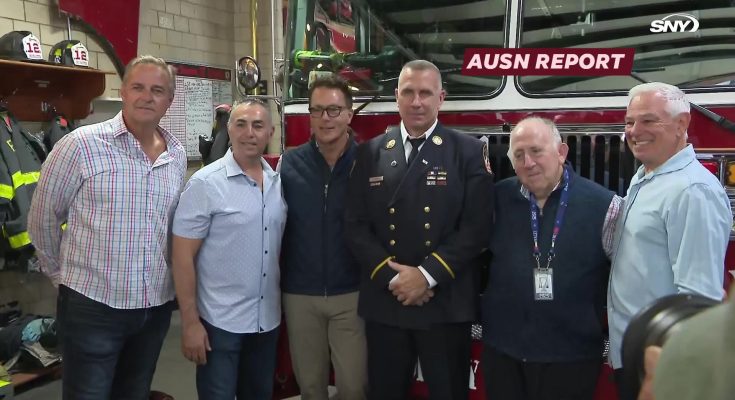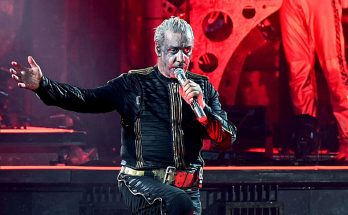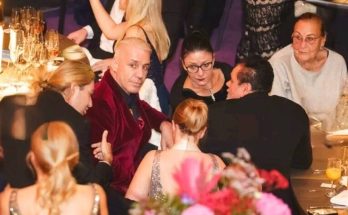On a morning of solemn remembrance and enduring gratitude, Al Leiter, John Franco, Todd Zeile, Jay Horwitz, and Bobby Valentine gathered at Engine 3/Ladder 12 in Manhattan to spend time with firefighters and first responders on September 11. The date carries a weight unlike any other in American history, and for those in New York, it is particularly personal. The presence of these former New York Mets icons at the firehouse was not just symbolic—it was heartfelt, a testament to the unbreakable bond between sports, community, and those who put their lives on the line in service of others. What happened on that fateful morning in 2001 forever altered the city, the country, and the world, and every year since, moments like this one have ensured that the sacrifices of first responders are not forgotten.
The men who showed up on this September morning were not just former athletes or team representatives. They were men who lived in the city, who experienced firsthand what New Yorkers endured in the aftermath of the attacks, and who used their platform then and now to provide comfort, solidarity, and gratitude. Bobby Valentine, who was managing the Mets during the 2001 season, has long been remembered for his leadership during those weeks when baseball helped offer some semblance of healing to a wounded city. John Franco, the Brooklyn-born closer and lifelong New Yorker, carried the city in his heart every time he took the mound. Al Leiter, Todd Zeile, and Jay Horwitz each played their role in ensuring that baseball wasn’t just a game in that moment—it was a source of togetherness.
When these men walked into the firehouse on September 11, 2025, they weren’t there for publicity or ceremony. They came to honor heroes. The firefighters and first responders of Engine 3/Ladder 12, like so many across the city, suffered unimaginable loss 24 years ago. The men and women of that house rushed toward danger while others fled, embodying courage and sacrifice that words can scarcely capture. To have athletes who once stood as symbols of joy and resilience in New York return on this day is powerful. It is a reminder that the sports world and the community are inseparably linked.
Moments like this also carry with them a history that cannot be overlooked. The Mets, perhaps more than any other sports franchise, became a beacon for New Yorkers in September 2001. Just 10 days after the attacks, on September 21, the Mets hosted the Braves at Shea Stadium in the first professional sporting event in New York following the tragedy. The game was electric, not because of the standings, but because it symbolized defiance, resilience, and unity. Mike Piazza’s iconic home run in the eighth inning lifted the city’s spirits in a way that nothing else could. Franco, Leiter, and Zeile were all there for that moment, and they knew what it meant. They played not just for wins, but for New York, for the firefighters, police officers, EMTs, and every grieving family searching for strength.
The connections forged in those days did not fade. Year after year, the Mets and their alumni have remained steadfast in honoring first responders. Jay Horwitz, the team’s longtime PR director, has worked tirelessly to keep that connection alive, ensuring that players continue to visit firehouses, attend memorials, and keep the memories of those lost alive in the hearts of fans and players alike. For Horwitz, who has spent decades telling the stories of Mets players, this story has always been bigger than baseball. It is about remembering who stepped forward when the city needed heroes.
The firefighters at Engine 3/Ladder 12 welcomed Leiter, Franco, Zeile, Horwitz, and Valentine with warmth, but also with the solemn recognition of what the day means. September 11 is not just another date on the calendar for them; it is a day of remembrance for brothers and sisters they lost, for families forever changed, for lives cut short. Sitting together, sharing stories, shaking hands, and offering gratitude, the Mets representatives made it clear that these firefighters will never stand alone on this day. Their presence was an affirmation that the sacrifices made two decades ago continue to be honored and appreciated.
For Al Leiter, who has always spoken passionately about what it meant to pitch for New York, the visit was deeply personal. He has long said that his time with the Mets during the 2001 season was the most meaningful of his career, not because of wins and losses, but because of the way the team connected with the community during its darkest hour. John Franco, too, has shared similar sentiments. As a native New Yorker, he carried immense pride in wearing the Mets uniform during that period. Franco has often said that visiting firehouses, attending funerals, and supporting families in the aftermath of the attacks were responsibilities he carried not as a player, but as a New Yorker.
Todd Zeile, who was playing his final season in 2001, often reflects on how much that year shaped him. His career ended not with fanfare for his own accomplishments, but with the understanding that baseball could help heal people, even in small ways. That perspective has stayed with him, and his presence at the firehouse this year shows that the connection remains deeply ingrained in who he is.
Bobby Valentine’s role in those days is also etched in memory. He became a public figure of comfort, a leader who recognized that the game of baseball was secondary, but also essential. He was seen at Ground Zero, he was involved in efforts to support families, and he guided his players through a season unlike any other. For him to be at Engine 3/Ladder 12 now is fitting, a continuation of his dedication to honoring those who sacrificed everything.
This gathering is also about the younger generation. Many of the firefighters serving today were children in 2001, growing up in the shadow of that day. To see legends of the Mets come into their firehouse and honor the legacy of those who came before them sends a powerful message: the memories of their predecessors are alive, and their sacrifices will never be forgotten. It ensures that as the years pass, the story of September 11 does not fade into history as just another date. It remains a living, breathing legacy, carried forward by acts of remembrance like this one.
Sports have always had the unique ability to bridge divides, to bring people together in joy and in grief. On September 11, 2001, New York was brought to its knees, but it rose again because of the resilience of its people. Firefighters, police officers, first responders, and ordinary citizens became symbols of that resilience. The Mets, through their actions on and off the field, became part of that story. Two decades later, when Al Leiter, John Franco, Todd Zeile, Jay Horwitz, and Bobby Valentine walk into a firehouse, they are not just former baseball men—they are part of the fabric of New York’s recovery and resilience.
For the firefighters at Engine 3/Ladder 12, the visit was a reminder that their sacrifices, past and present, are recognized. For the Mets alumni, it was a way to say thank you and to ensure that they continue to stand alongside those who have given so much. For the city, it was another chapter in the enduring bond between New York’s heroes and its teams. On this day, when grief and memory intertwine, moments like this show that New Yorkers will always come together to honor their own.
The morning gathering at the firehouse was not about speeches or ceremonies, but about presence. Presence matters on September 11. Being there, standing side by side, looking each other in the eye—it is the kind of gesture that carries weight far beyond words. It shows that remembrance is not passive; it is active, lived out in actions of gratitude and solidarity.
As the years pass, it becomes increasingly important to keep these traditions alive. The world has changed since 2001, and generations have grown up with only secondhand knowledge of that day. But with each visit, each tribute, each act of remembrance, the legacy endures. The Mets and their alumni have taken that responsibility seriously, and their visit to Engine 3/Ladder 12 in Manhattan this morning is proof of that ongoing commitment.
In the end, what happened at the firehouse was simple but profound: a group of men who once wore the Mets uniform came to say thank you to the men and women who represent courage and sacrifice. On a day that weighs heavily on the hearts of millions, they offered solidarity, gratitude, and remembrance. It was a gesture that will be remembered not just by the firefighters who were there, but by everyone who understands the significance of September 11. The bond between sports and community was once again on display, reminding us all that while we may come from different walks of life, we share a common duty to remember, to honor, and to never forget.



